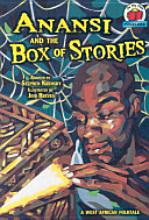This month my local public library is offering a marionette show of African folktales starring Anansi the spider. It’s a unique way to celebrate Black History Month; what better way to introduce my kids to African influence on this country than getting to know of their stories?
But of course, my focus won’t be the same as the public library, since I’m interested most in finding Christ in African culture. If I truly believe as the Bible says that God has set the appointed boundaries for every nation (Acts 17), and has done so to show forth his glory, then we ought to be able to see something of Him in the nation, tongues, and tribes of the earth. But since man is sinful, we’ll also see a unique need for Him. And it’s my goal this month: to find both character and need of Christ in folktales of African culture.
Resources for Kids:
- For ages 4-10: A Story, a Story
Retold by Gail E. Haley. Aladdin. 36 pgs.
- For ages 4-8: Anansi and the Talking Melon
Retold by Eric A. Kimmel. Holiday House. 32 pgs.
- For beginner readers: Anansi and the Box of Stories: A West African Folktale (On My Own Folklore)
by Stephen Krensky. First Avenue Editions. 48 pgs.
- For ages 8-12: African Folk Tales (Dover Children’s Thrift Classics)
by Hugh Vernon-Jackson, editor. Dover Publications. 64 pgs.
- For Ages 12-up: African Folktales (The Pantheon Fairy Tale and Folklore Library)
by Roger Abrahams. Pantheon. 384 pgs.
Next week, Janie and I will include a couple of other resources like CDs and African American books. But this will get you started!
One Minute Intro: African Stories and The Joy of Living
If you read the very detailed introduction to Roger Abrahams’ book on African folktales, perhaps the first thing that jumps out about African stories is that they aren’t a product of a book culture. They are stories that have been handed down over many generations by an oral culture and a tribal one at that.
In my interview below, I ask Kalenda Moise Kabukala, a native of the Congo, to help sum up African culture for me. His answer is that Africans exhibit the joy of living unlike any other culture. They are so expressive—never settling for a quick propositional answer when a story could be inserted. And music, he said, is something that is not apart from everyday life but deeply and inextricably part of it. Africans sing when someone dies, they sing when someone is born, they sing to express just about anything and everything. Like the Japanese culture we talked about last month, they are also tend to think about things in terms of community, not as individuals.
These traits certainly reflect many aspects of God Himself. What a gift to the world—a culture of joy! I’m reminded of the maker of joy, Christ, who “for the joy set before Him” endured death on a cross. But of course, in a world in which truth is so often obscured by falsehood, joy and community alone cannot be man’s highest good. Which is why Africans, just like us, need the forgiveness and redemption found in Jesus Christ.
An Interview
[powerpress]
I was connected to Mr. Kabukala through Roger Lowther, whom I interviewed last month, and a missionary connection of his. And despite the fact that Mr. Kabukala is a software engineer, his insights on Anansi and other tales really helped me understand what I’ve been reading. A few of his words are hard to make out on our phone connection, but his accent is just so lovely that I had to let you hear him for yourself. Hope you enjoy! And watch next week for, hopefully, a wrap up post as well as a follow-up interview with an American author who grew up in Ethiopia.
Have you guys read any great African folktales? Any favorite characters we ought not to miss? Any questions you’d like me to ask the African author next week?
Support our writers and help keep Redeemed Reader ad-free by joining the Redeemed Reader Fellowship.
Stay Up to Date!
Get the information you need to make wise choices about books for your children and teens.
Our weekly newsletter includes our latest reviews, related links from around the web, a featured book list, book trivia, and more. We never sell your information. You may unsubscribe at any time.
We'd love to hear from you!
Our comments are now limited to our members (both Silver and Golden Key). Members, you just need to log in with your normal log-in credentials!
Not a member yet? You can join the Silver Key ($2.99/month) for a free 2-week trial. Cancel at any time. Find out more about membership here.
3 Comments
Leave a Comment
You must be logged in to post a comment.



I’m a missionary mom in Uganda. We enjoy reading the Elizabeti series for a real peek into life as a little girl in an Tanzanian village. It’s real life!
I’m so honored to get your suggestion, Abby. Thanks! I will definitely look the series up. Anything to add regarding African culture? How you see they need/reflect Christ?
My first introduction to Anansi was through a collection of stories by Susan Perrow. Many of the stories are originals written by Perrow and heavily influenced by her time in Africa, particularly Kenya, I believe, but her book also includes some of the Anansi stories. My boys love the stories in this book and they address so many of the discipline and/or character development moments that we face in our family’s day to day life. When there has been a particular behavior struggle we’ve encountered that day I will often pick a story at bedtime from that behavior’s designated chapter of the book and read. It rarely fails to hit the mark in my children’s conscience and thought and leave them focused on the glorifying response to their situations as they fall asleep.